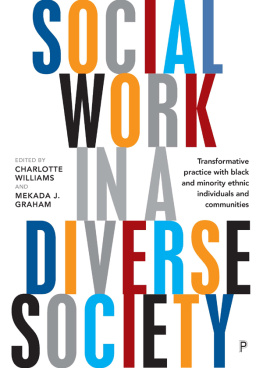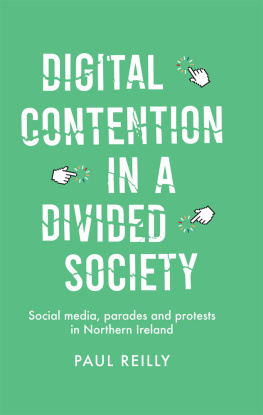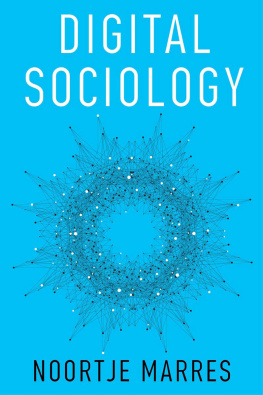Social Work in a
Digital Society
Social Work in a
Digital Society
SUE WATLING
JIM ROGERS
Series Editors: Jonathan Parker and Greta Bradley
Learning Matters
An imprint of SAGE Publications Ltd
1 Olivers Yard
55 City Road
London EC1Y 1SP
SAGE Publications Inc.
2455 Teller Road
Thousand Oaks, California 91320
SAGE Publications India Pvt Ltd
B 1/I 1 Mohan Cooperative Industrial Area
Mathura Road
New Delhi 110 044
SAGE Publications Asia-Pacific Pte Ltd
3 Church Steet
#1004 Samsung Hub
Singapore 049483
Editor: Luke Block
Development Editor: Kate Lodge
Production Controller: Chris Marke
Project Management: Deer Park Productions,
Tavistock, Devon
Marketing Manager: Tamara Navaratnam
Cover Design: Code 5
Typeset by: Pantek Media, Maidstone, Kent
Printed by: TJ International Ltd, Padstow, Cornwall
Sue Watling and Jim Rogers 2012
First published in 2012
Apart from any fair dealing for the purposes of research or private study, or criticism or review, as permitted under the Copyright, Design and Patents Act, 1988, this publication may be reproduced, stored or transmitted in any form, or by any means, only with the prior permission in writing of the publishers, or in the case of reprographic reproduction, in accordance with the terms of licences issued by the Copyright Licensing Agency. Enquiries concerning reproduction outside these terms should be sent to the publishers.
Professional Capabilities Framework diagram reproduced with permission of The College of Social Work
Library of Congress Control Number:
2012933566
British Library Cataloguing in Publication Data
A catalogue record for this book is available from the British Library
ISBN: 978 0 85725 844 1
ISBN: 978 0 85725 677 5 (pbk)
About the authors
Sue Watling is a Learning and Teaching Co-ordinator in the Centre for Educational Research and Development (CERD) at the University of Lincoln. As well as supporting staff in the design and delivery of inclusive and accessible online learning opportuniities, Sue teaches and researches on the social impact of the internet and digital inclusion. Her qualifications include a BA in Social Science, an MA in Gender Studies and an MA in Open and Distance Education. Currently undertaking PhD research into digital inclusion, Sue is a Fellow of the Higher Education Academy (HEA), a member of the Association for Learning Development in Higher Education (ALDinHE) and holds Learning Technologist certification with the Association for Learning Technology (CMALT).
Jim Rogers is a Senior Lecturer in the School of Health and Social Care at the University of Lincoln. He teaches on a range of undergraduate and postgraduate social work and nursing programmes, particularly those with a mental health focus, and has professional qualifications in mental health nursing (RMN), complementary medicine (RS Hom), Higher Education teaching and learning, and an MSc in Health Sciences Research from the University of York. Jim is a Fellow of the Higher Education Academy (HEA) and his research interests include aspects of personalisation; mental capacity issues; complementary medicine and the use of homeopathy; addictions, particularly the prevalence and impact of gambling problems and inequalities like the growth of digital divides. Jim is currently researching the impact of the new Deprivation of Liberty Safeguards on care homes in Lincolnshire and the effect of digital developments on local social work practice.
Series editors preface
The Western world, including the UK, faces numerous challenges over forthcoming years, many of which are brought to the fore by ever-developing technologies that become outdated as quickly as they become part of everyday realities. Challenges also include dealing with the impact of an increasingly ageing population, with its attendant social care needs, and working with the financial implications that such a changing demography brings, and learning new social performances to effect care or to stay in contact with others. At the other end of the lifespan the need for high-quality childcare, welfare and safeguarding services have been highlighted as society develops and responds to a changing complexion. National and global perturbations have continued to be influenced by social media and technologies. The contemporary world demands engagement with such and social work needs also to respond.
Migration has increased as a global phenomenon and we now live and work with the implications of global issues in our everyday and local lives. Often these issues influence how we construct our social services and determine what services we need to offer, including the ways in which we offer these services. It is likely that as a social worker you will work with a diverse range of people throughout your career, many of whom have experienced significant, and traumatic, events that require a professional and caring response grounded, of course, in the laws and social policies that have developed as a result. As well as working with individuals, however, you may be required to respond to the needs of a particular community disadvantaged by world events or excluded within local communities because of assumptions made about them, and you may be embroiled in some of the tensions that arise from implementing policy-based approaches that may conflict with professional values. What is clear within these contexts is that you may be working with a range of people who are often at the margins of society, socially excluded or in need of protection and safeguarding. Technologies may be useful in dealing with some of these issues but may also be implicated in the further marginalisation of those people with whom social workers practise. This book provides important knowledge and information to help you become aware of these issues, and to respond appropriately when faced with new technologies, older technologies and challenging situations.
The importance of social work education came to the fore again following the inquiry into the death of baby Peter and the subsequent report from the Social Work Task Force set up in its aftermath. It is timely, also, to reconsider elements of social work education as it is being taken forward by the Reform Board process in England and its implementation indeed, we should view this as a continual striving for excellence! Reflection, revision and reform allow us to focus clearly on what knowledge is useful to engage with in learning to be a social worker, and using information technologies are part of this: social workers are part of digital society. The focus on statutory social work, and by dint of that involuntary clients, brings to the fore the need for social workers to be well versed in the mechanisms and nuances of legislation that can be interpreted and applied to empower, protect and assist, but also to understand the social policy arena in which practice is forged. This important book provides readers with a beginning sense of the complexities and anomalies of digital society and its connections with contemporary social work.
The books in this series respond to the agendas driven by changes brought about by professional body, Government and disciplinary review. They aim to build on and offer introductory texts based on up-to-date knowledge and social policy development and to help communicate this in an accessible way, preparing the ground for future study as you develop your social work career. The books are written by practitioners and academics who are passionate about social work and social services and aim to instil that passion in others. The knowledge introduced in this book is important for all social workers in all fields of practice as they seek to reaffirm social works commitment to those it serves.












